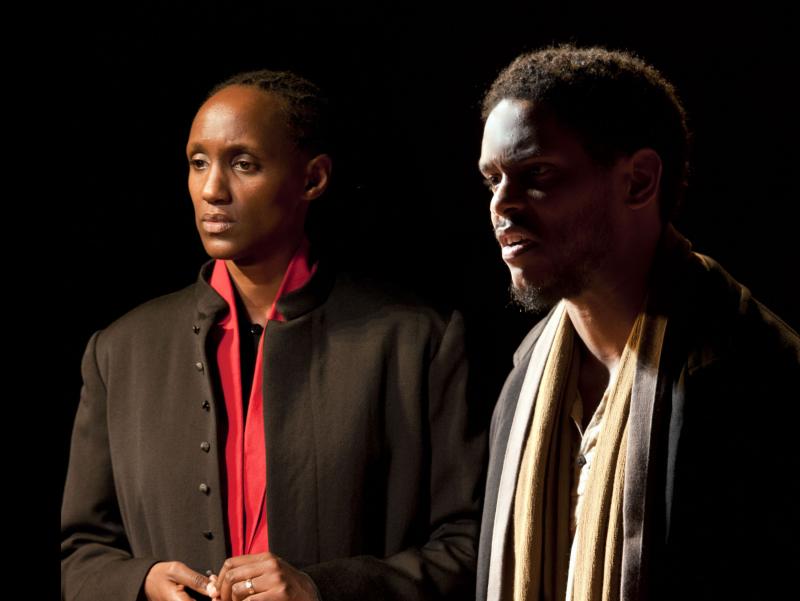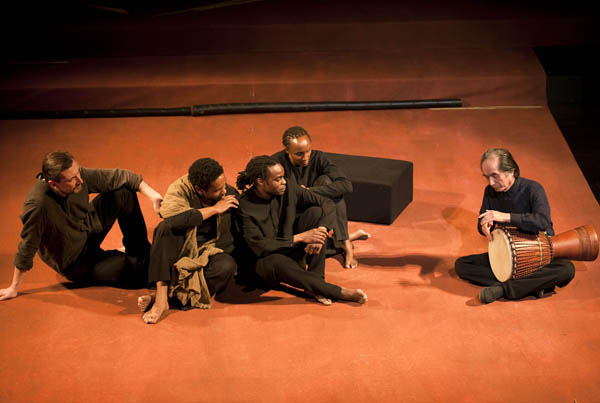Battlefield, Young Vic Theatre | reviews, news & interviews
Battlefield, Young Vic Theatre
Battlefield, Young Vic Theatre
Peter Brook revisits 'The Mahabharata' with a perfection that ultimately feels chilly

Legendary director Peter Brook makes theatre that teaches audiences to be human. Now 90 years old, he brings his latest project to London from Paris, where he has been based at the Bouffes du Nord since quitting the UK more than 40 years ago.
Co-created with his long-term collaborators Jean-Claude Carrière and Marie-Hélène Estienne, Battlefield is set in the aftermath of the great battle – which according to the myth lasts 18 days, and has left millions of bodies lying on the ground – so the evening begins with a vivid description of this carnage. As one of the survivors says, “Victory is a defeat.” The victor of the monumental slaughter, Yudishtira, the new Pandava king, is left with the question of how to make sense of the senselessness of war.
I particularly liked the wry humour of the fable of the worm crossing the road
As Yudishtira (Jared McNeill) seeks out the old blind king, Dritarashtra (Sean O’Callaghan), he also takes council from the queen Kunti (Carole Karemera) and a handful of other sages (Ery Nzaramba). What makes this complicated ancient family saga accessible is the parables and stories told as these tormented kings search for the way and the light. I particularly liked the wry humour of the fable of the worm crossing the road, and the story of the snake who attempts to wriggle out of responsibility for biting a child to death.
On a bare platform stage, beautifully lit by Philippe Vialatte, the sun-baked ochres and orange tints glow while the four-strong cast are dressed in black, with red and orange scarves. A mild feeling of summer heat radiates from the set, while Toshi Tsuchitori’s drumming – at one point sublime – punctuates the story (pictured below). All the actors move with an impressively controlled stillness of being, confident and smooth as if in the grip of a kind of perfection that you rarely see in London. They speak with a gently majestic rolling delivery that gives this tale a Shakespearean dimension, and the text has the simple limpid quality of ancient parable or fable. Here the stage is a place of melody, aural, visual and textual.
 Amid the stillness, there are some memorable moments, as when a bunched cloth is turned into a baby, which floats Moses-like on the river (in this case the Ganges rather than the Nile), or when a snake is tied up and releases itself, or when a woman utters the most piercing cries you have ever heard. At the same time, it’s hard to be unaware that we are being taught a lesson in religious philosophy, that behind the beauty stands Brook, and he is telling us, with his typically cool perfectionism, that to be human means to relinquish all earthly goods, and concerns, to strip ourselves bare in front of the eternity of spirit.
Amid the stillness, there are some memorable moments, as when a bunched cloth is turned into a baby, which floats Moses-like on the river (in this case the Ganges rather than the Nile), or when a snake is tied up and releases itself, or when a woman utters the most piercing cries you have ever heard. At the same time, it’s hard to be unaware that we are being taught a lesson in religious philosophy, that behind the beauty stands Brook, and he is telling us, with his typically cool perfectionism, that to be human means to relinquish all earthly goods, and concerns, to strip ourselves bare in front of the eternity of spirit.
But although the contemporary resonances of a show about the aftermath of bloody war are immediately apparent, the message of acceptance and resignation is a bit hard to stomach. Are we really supposed to accept, to take one instant example, that the plight of Syrian refugees is just another example of the wheel of fortune and to relinquish any agony that we, or they, might feel? Yet without such contemporary echoes Battlefield is just an exercise in Orientalism, a way in which a comfortably middle-class audience appreciates the ancient wisdom of India and pats itself on its back, saying, how interesting, how broadminded we are, how exotic. And then do nothing.
rating
Buy
Share this article
The future of Arts Journalism
You can stop theartsdesk.com closing!
We urgently need financing to survive. Our fundraising drive has thus far raised £49,000 but we need to reach £100,000 or we will be forced to close. Please contribute here: https://gofund.me/c3f6033d
And if you can forward this information to anyone who might assist, we’d be grateful.

Subscribe to theartsdesk.com
Thank you for continuing to read our work on theartsdesk.com. For unlimited access to every article in its entirety, including our archive of more than 15,000 pieces, we're asking for £5 per month or £40 per year. We feel it's a very good deal, and hope you do too.
To take a subscription now simply click here.
And if you're looking for that extra gift for a friend or family member, why not treat them to a theartsdesk.com gift subscription?
more Theatre
 Macbeth, RSC, Stratford review - Glaswegian gangs and ghoulies prove gripping
Sam Heughan's Macbeth cannot quite find a home in a mobster pub
Macbeth, RSC, Stratford review - Glaswegian gangs and ghoulies prove gripping
Sam Heughan's Macbeth cannot quite find a home in a mobster pub
 The Line of Beauty, Almeida Theatre review - the 80s revisited in theatrically ravishing form
Alan Hollinghurst novel is cunningly filleted, very finely acted
The Line of Beauty, Almeida Theatre review - the 80s revisited in theatrically ravishing form
Alan Hollinghurst novel is cunningly filleted, very finely acted
 Wendy & Peter Pan, Barbican Theatre review - mixed bag of panto and comic play, turned up to 11
The RSC adaptation is aimed at children, though all will thrill to its spectacle
Wendy & Peter Pan, Barbican Theatre review - mixed bag of panto and comic play, turned up to 11
The RSC adaptation is aimed at children, though all will thrill to its spectacle
 Hedda, Orange Tree Theatre review - a monument reimagined, perhaps even improved
Scandinavian masterpiece transplanted into a London reeling from the ravages of war
Hedda, Orange Tree Theatre review - a monument reimagined, perhaps even improved
Scandinavian masterpiece transplanted into a London reeling from the ravages of war
 The Assembled Parties, Hampstead review - a rarity, a well-made play delivered straight
Witty but poignant tribute to the strength of family ties as all around disintegrates
The Assembled Parties, Hampstead review - a rarity, a well-made play delivered straight
Witty but poignant tribute to the strength of family ties as all around disintegrates
 Mary Page Marlowe, Old Vic review - a starry portrait of a splintered life
Tracy Letts's Off Broadway play makes a shimmeringly powerful London debut
Mary Page Marlowe, Old Vic review - a starry portrait of a splintered life
Tracy Letts's Off Broadway play makes a shimmeringly powerful London debut
 Little Brother, Soho Theatre review - light, bright but emotionally true
This Verity Bargate Award-winning dramedy is entertaining as well as thought provoking
Little Brother, Soho Theatre review - light, bright but emotionally true
This Verity Bargate Award-winning dramedy is entertaining as well as thought provoking
 The Unbelievers, Royal Court Theatre - grimly compelling, powerfully performed
Nick Payne's new play is amongst his best
The Unbelievers, Royal Court Theatre - grimly compelling, powerfully performed
Nick Payne's new play is amongst his best
 The Maids, Donmar Warehouse review - vibrant cast lost in a spectacular-looking fever dream
Kip Williams revises Genet, with little gained in the update except eye-popping visuals
The Maids, Donmar Warehouse review - vibrant cast lost in a spectacular-looking fever dream
Kip Williams revises Genet, with little gained in the update except eye-popping visuals
 Ragdoll, Jermyn Street Theatre review - compelling and emotionally truthful
Katherine Moar returns with a Patty Hearst-inspired follow up to her debut hit 'Farm Hall'
Ragdoll, Jermyn Street Theatre review - compelling and emotionally truthful
Katherine Moar returns with a Patty Hearst-inspired follow up to her debut hit 'Farm Hall'
 Troilus and Cressida, Globe Theatre review - a 'problem play' with added problems
Raucous and carnivalesque, but also ugly and incomprehensible
Troilus and Cressida, Globe Theatre review - a 'problem play' with added problems
Raucous and carnivalesque, but also ugly and incomprehensible
 Clarkston, Trafalgar Theatre review - two lads on a road to nowhere
Netflix star, Joe Locke, is the selling point of a production that needs one
Clarkston, Trafalgar Theatre review - two lads on a road to nowhere
Netflix star, Joe Locke, is the selling point of a production that needs one

Add comment